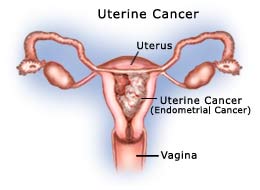 Uterine cancer is a problem that frightens many women. This type of cancer begins in the uterus. In 2014, just over 52,000 women were newly diagnosed with uterine cancer, and about 8,590 women will die from the diseaseaccording to the American Cancer Society. Uterine cancer affects women of all ages and races. It is a bit more likely for white women to get uterine cancer, but more black women tend to die of it. Right now, there are over 600,000 women who have survived uterine cancer and lived to tell the tale.
Uterine cancer is a problem that frightens many women. This type of cancer begins in the uterus. In 2014, just over 52,000 women were newly diagnosed with uterine cancer, and about 8,590 women will die from the diseaseaccording to the American Cancer Society. Uterine cancer affects women of all ages and races. It is a bit more likely for white women to get uterine cancer, but more black women tend to die of it. Right now, there are over 600,000 women who have survived uterine cancer and lived to tell the tale.
Symptoms of Uterine Cancer
Understanding the symptoms of uterine cancer can help women get early treatment. The first sign is usually vaginal bleeding that is definitely not like a normal period. Vaginal bleeding might be very watery and streaked with blood, and become worse over time. It doesn’t go in cycles like a normal menstrual cycle does. Women who have gone through menopause and suddenly begin experiencing vaginal bleeding again might be facing the symptoms of uterine cancer. Other common symptoms of uterine cancer include spotting and discharge from the vagina, pain in the pelvic area, either sharp or aching, pain during intercourse and when urinating. There might also be difficulty in emptying the bladder.
When to See a Doctor
Any of the symptoms of uterine cancer should be reviewed by your physician. Even if these issues are not uterine cancer, they could be a sign that something is going wrong in your body, which definitely deserves medical attention.
Risk Factors of Uterine Cancer
What causes uterine cancer? As with most cancers, there is really no way to know why one person gets a particular type of cancer and another person does not. However, there might be certain risk factors that make a woman more likely to develop uterine cancer.
- Age and race. Women who are over the age of 50 are more likely to develop uterine cancer and the average age is 60. Women who are white are more likely to be diagnosed with the cancer.
- Genetics or other cancers. If you have a family history of cancer, especially cancers of the colon, you are at higher risk. Those who have had breast or ovarian cancer are also much more likely to develop uterine cancer.
- Other health conditions. Those with diabetes, endometrial hyperplasia, lynch syndrome, and a family history of non-polyposis colorectal cancer are at higher risk.
- Obesity and diet. Those who are overweight or have a diet high in animal fat might develop uterine cancer.
- Drugs and therapies.Women who have had radiation therapy in the pelvic area, have taken tamoxifen or have been exposed to large doses of estrogen are inclined to develop this cancer.
Treatment of Uterine Cancer
The proper treatment for uterine cancer depends upon how severe it is and other health factors. The treatments are typically one or several of the following:
- Chemotherapy. Chemotherapy drugs can be taken by mouth or by injection. These drugs attack the bad cells in the body, often using strong chemicals to do so.
- Hormone Therapy. Hormone therapies can be helpful if the uterine cancer is extensive. These drugs might increase the progesterone in your body and decrease the estrogen.
- Radiation. This therapy uses powerful energy beams to shrink tumors, making pain more manageable and helping alleviate symptoms of the cancer. It often works in tandem with other approaches. Radiation might be administered by a machine, or it might be given to you from a small device, which is known as internal radiation, implanted inside the body,.
- Surgery. In many cases, surgery to remove the uterus is required. You might also have your fallopian tubes and ovaries removed. Surgical intervention also means that doctor should look closely at your body to determine if the cancer has spread.
Preventions of Uterine Cancer
There are a few ways to reduce the risk of uterine cancer. Here are some steps you should take right now to help ensure you stay healthy.
- Visit Your Doctor. Regular checkups are essential to make sure nothing changes in your body. If you have already dealt with the symptoms of uterine cancer, this allows your doctor to continue monitoring it.
- Use Oral Contraceptives. Birth control pills have been shown to cut down on the risk of some cancers. Even taking the pills for one year can have lasting positive effects.
- Pay Attention to Your Weight. Those who are overweight are more likely to develop uterine cancer and other problems, so keep your weight at a healthy level.
- Exercise Regularly. Not only does exercise help you lose weight, the activity alone can help reduce your risk of developing uterine cancer, so take exercise regularly.
Here is more information on how to spot the symptoms of uterine cancer and diagnose the problem:


